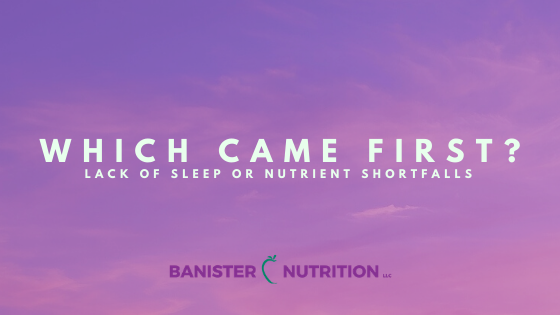Which Came First? Lack of Sleep or Nutritient Shortfalls?
How are you taking care of yourself? Taking care of yourself directly impacts your ability to care for others. Think – are you getting the sleep you need, managing stress in a positive way, meeting your nutritional needs, getting in physical exercise?
Which came first? Are nutrient shortfalls secondary to lack of sleep or lack of sleep secondary to nutrient shortfalls?
The answer – either one can cause an impact on the other. There are some common nutritional deficiencies that may prevent us from getting adequate sleep and/or caused by lack of sleep. Ideally, we should get 7 to 9 hours of sleep at night. However, less than 1% of the population falls into the “exception” category of needing less or more than this. If you are not meeting this guideline, you are likely putting yourself at risk for nutrient deficiencies and causing your sleep to be worse.
Adults with less than 7 hours of sleep at night have been found to have nutrient shortfalls in vitamin D, vitamin E, magnesium, vitamin C, vitamin A, calcium, vitamin K, potassium and omega 3s.
- Did you know 96% of Americans don’t eat enough vitamin D?
- Vitamin D plays an important role in lung health, insulin secretion, bone health, brain health, heart health, inflammation, muscle health, and our immune system.
- Did you know 55% of Americans don’t eat enough magnesium?
- Magnesium plays an important role in our bones/teeth, regulation of heartbeat, muscles, nervous system, metabolism, and cellular energy.
- Did you know 95% of Americans don’t eat enough omega 3s?
- Omega 3s play an important role in eye health, maintaining healthy triglycerides, healthy blood pressure, brain health, heart health, and inflammation.
Having a balanced diet with a variety of produce and protein sources can help prevent nutritional deficiencies. Nutrient-dense food sources include:
- Vitamin D: Egg yolk, mushroom, fatty fish, cod liver oil, fortified foods/beverages (cereal/orange juice/milk)
- Vitamin E: Almonds, avocado, fatty fish, sunflower seeds, hazelnuts, spinach, butternut squash, olive oil, kiwi
- Vitamin C: Kale, broccoli, green chili pepper, bell pepper, coriander, kiwi, strawberry, lemon, grapefruit, pineapple, orange, papaya, tomato
- Vitamin A: Liver, cod liver oil, spinach, butternut squash, mustard greens, tomato, fatty fish, carrot, sweet potato, cantaloupe, red bell pepper, parsley
- Vitamin K: Kale, broccoli, brussels sprouts, cabbage, cucumber, asparagus, kiwi, avocado, cheese, eggs, chicken, butter
- Magnesium: Pumpkin seeds, almonds, spinach, quinoa, beans, dark chocolate, peanuts, edamame, cashews, cacao powder, oatmeal, avocado, broccoli, banana
- Calcium: Milk, cheese, yogurt, fish, spinach, kale, collard greens, beans, lentils, walnuts, edamame, fortified drinks (almond milk/orange juice), chia seeds, sesame seeds, almonds, broccoli, tofu
- Potassium: Pistachios, beet greens, salmon, white beans, potatoes, milk, mushrooms, avocado, tomato, flaxseed, pumpkin seed, peanuts, almonds, banana, acorn squash, broccoli, brussels sprouts, celery, watermelon
- Omega 3s: Fatty fish (anchovies, sardines, herring, trout, salmon, mackerel, albacore tuna), basil, chia seeds, flax seeds, spinach, walnuts, edamame, brussels sprouts, avocado
Whether lack of sleep causes nutrient abnormalities or nutrient abnormalities causes a lack of sleep, it is important to make both a priority to help the body function properly. They both play a key role in overall health. Speak with your Dietitian about ways you can improve stress, sleep, and nutrition. LN









